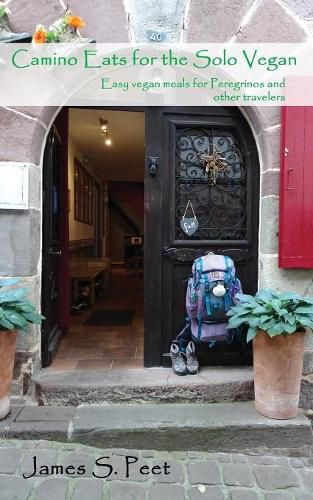Readings Newsletter
Become a Readings Member to make your shopping experience even easier.
Sign in or sign up for free!
You’re not far away from qualifying for FREE standard shipping within Australia
You’ve qualified for FREE standard shipping within Australia
The cart is loading…






This title is printed to order. This book may have been self-published. If so, we cannot guarantee the quality of the content. In the main most books will have gone through the editing process however some may not. We therefore suggest that you be aware of this before ordering this book. If in doubt check either the author or publisher’s details as we are unable to accept any returns unless they are faulty. Please contact us if you have any questions.
This cookbook is a bit different than all the others you’ll find on the bookshelf. First off, there’s nothing about healthy diets, diet fads, the newest things to eat, or anything even remotely similar. It’s a cookbook designed for the vegan traveler in mind. Specifically, for those willing to take the time and energy to make the pilgrimage to the Cathedral of St. James in Santiago de Compastela, Spain. This pilgrimage, also known as The Way (or The Way of St. James) is a civilized walk across Spain, but one fraught with peril for vegans. That’s because, in Spain, a vegetable salad includes tuna, and ham is ubiquitous, even in dishes one might consider vegetarian.
Inside are recipes to help the vegan Peregrino cope with the rigors of hiking for 500 miles (or more). The food is basic, filling, but also tasty, with numerous permutations for many of the meals. Best of all, most of the ingredients can be bought for a lot less than the price of a similar meal in a restaurant (even less than what you would pay for the menu de Peregrino).
This book is not only for the Peregrino, though, it’s also useful for any vegan traveler who has access to basic cooking facilities (even a portable camp stove). While geared mainly to those visiting Spain, it can be useful throughout Europe, parts of Africa and Asia, the Americas, and most of Oceania.
While mainly developed for vegans, it’s not limited to them. The recipes in this book are adaptable to those desiring meat, poultry, or fish. As we said, this is a different type of cookbook - no messages, just meals.
$9.00 standard shipping within Australia
FREE standard shipping within Australia for orders over $100.00
Express & International shipping calculated at checkout
This title is printed to order. This book may have been self-published. If so, we cannot guarantee the quality of the content. In the main most books will have gone through the editing process however some may not. We therefore suggest that you be aware of this before ordering this book. If in doubt check either the author or publisher’s details as we are unable to accept any returns unless they are faulty. Please contact us if you have any questions.
This cookbook is a bit different than all the others you’ll find on the bookshelf. First off, there’s nothing about healthy diets, diet fads, the newest things to eat, or anything even remotely similar. It’s a cookbook designed for the vegan traveler in mind. Specifically, for those willing to take the time and energy to make the pilgrimage to the Cathedral of St. James in Santiago de Compastela, Spain. This pilgrimage, also known as The Way (or The Way of St. James) is a civilized walk across Spain, but one fraught with peril for vegans. That’s because, in Spain, a vegetable salad includes tuna, and ham is ubiquitous, even in dishes one might consider vegetarian.
Inside are recipes to help the vegan Peregrino cope with the rigors of hiking for 500 miles (or more). The food is basic, filling, but also tasty, with numerous permutations for many of the meals. Best of all, most of the ingredients can be bought for a lot less than the price of a similar meal in a restaurant (even less than what you would pay for the menu de Peregrino).
This book is not only for the Peregrino, though, it’s also useful for any vegan traveler who has access to basic cooking facilities (even a portable camp stove). While geared mainly to those visiting Spain, it can be useful throughout Europe, parts of Africa and Asia, the Americas, and most of Oceania.
While mainly developed for vegans, it’s not limited to them. The recipes in this book are adaptable to those desiring meat, poultry, or fish. As we said, this is a different type of cookbook - no messages, just meals.